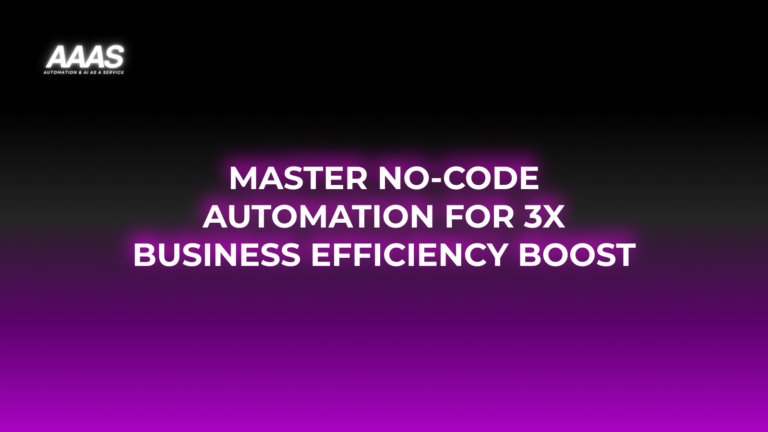“`html
Automation with No-Code Solutions for Workflow Efficiency

Last updated on: October 24, 2023
Introduction
In today’s fast-paced business environment, organizations face numerous challenges stemming from inefficient workflows. Manual processes often lead to delays, errors, and increased operational costs. Traditional automation involves complex coding that can be inaccessible for non-technical employees. Enter no-code automation solutions—a game changer for workforce productivity.
Benefits of No-Code Automation
1. Streamlined Processes
No-code platforms like Zapier and Airtable allow you to automate routine tasks effortlessly, making processes faster.
2. Cost Reduction
By minimizing reliance on IT departments for custom coding solutions, businesses can allocate resources more efficiently.
3. Increased Accessibility
No-code tools empower employees at all technical levels to build and modify workflows, enhancing collaboration.
Real Use Cases
*Marketing Automation:* Companies use no-code tools for automating email campaigns and tracking leads, resulting in improved customer engagement.
*Sales CRM Integration:* Utilize no-code platforms to connect disparate sales applications, ensuring data consistency and real-time updates.
Technical Details
No-code automation tools operate on an intuitive drag-and-drop interface, allowing users to design their workflows visually. They often support API integration to connect various software applications seamlessly.
Pricing Analysis
Many no-code solutions offer tiered subscription models:
| Tool | Basic Plan | Pro Plan |
|---|---|---|
| Zapier | $19.99/month | $49/month |
| Airtable | $10/month | $20/month |
Investing in these tools can result in significant savings, often paying for themselves within a short time frame.
Setup Steps
1. Identify Repetitive Tasks
Assess existing processes to pinpoint areas for automation.
2. Choose a No-Code Tool
Select a tool that aligns with your workflow needs.
3. Design Your Workflow
Using the tool’s intuitive interface, create the desired automation.
4. Test and Implement
Conduct tests before rolling out the automation organization-wide.
Pros and Cons
Pros
- User-friendly interfaces
- Speed up automation processes
- Lower costs than traditional coding
Cons
- Limitations in complex automation needs
- Scalability constraints
- Potential for vendor lock-in
Expert Tips
1. Regularly review automated workflows to ensure they adapt to changing business needs.
2. Consider security implications when connecting various applications.
3. Empower teams with training on no-code tools to maximize ROI.
Conclusion
No-code automation solutions are reshaping how businesses approach workflow efficiency. By implementing these tools, organizations can not only enhance productivity but also achieve significant cost savings.
Frequently Asked Questions
What are no-code automation tools?
No-code automation tools allow users to create workflows and automate tasks without programming knowledge.
How can no-code solutions enhance efficiency?
They streamline processes, minimize human error, and increase speed, saving time and reducing operational costs.

“`
### SEO Metadata
– **Meta Title:** No-Code Automation for Workflow Efficiency
– **Meta Description:** Discover how no-code solutions streamline workflows, boost efficiency, and reduce costs. A step-by-step guide for businesses.
– **Focus Keyword:** No-Code Automation
– **LSI Keywords:** Workflow Automation, Efficiency, Cost Reduction, No-Code Tools, Business Efficiency
### Schema Markups
– **Author Schema** includes information about the author.
– **Article Schema** provides information about the article.
– **FAQ Schema** addresses common questions related to the topic.
This complete HTML structure is ready for integration into WordPress, ensuring both an informative and SEO-optimized article.








